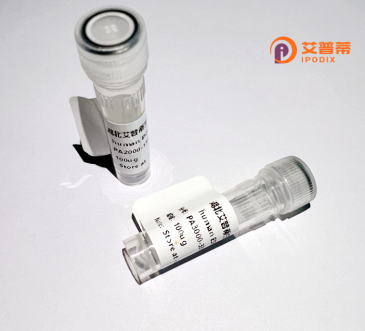
| 纯度 | >90%SDS-PAGE. |
| 种属 | Human |
| 靶点 | KLHL20 |
| Uniprot No | Q9Y2M5 |
| 内毒素 | < 0.01EU/μg |
| 表达宿主 | E.coli |
| 表达区间 | 1-609aa |
| 活性数据 | MEGKPMRRCTNIRPGETGMDVTSRCTLGDPNKLPEGVPQPARMPYISDKHPRQTLEVINLLRKHRELCDVVLVVGAKKIYAHRVILSACSPYFRAMFTGELAESRQTEVVIRDIDERAMELLIDFAYTSQITVEEGNVQTLLPAACLLQLAEIQEACCEFLKRQLDPSNCLGIRAFADTHSCRELLRIADKFTQHNFQEVMESEEFMLLPANQLIDIISSDELNVRSEEQVFNAVMAWVKYSIQERRPQLPQVLQHVRLPLLSPKFLVGTVGSDPLIKSDEECRDLVDEAKNYLLLPQERPLMQGPRTRPRKPIRCGEVLFAVGGWCSGDAISSVERYDPQTNEWRMVASMSKRRCGVGVSVLDDLLYAVGGHDGSSYLNSVERYDPKTNQWSSDVAPTSTCRTSVGVAVLGGFLYAVGGQDGVSCLNIVERYDPKENKWTRVASMSTRRLGVAVAVLGGFLYAVGGSDGTSPLNTVERYNPQENRWHTIAPMGTRRKHLGCAVYQDMIYAVGGRDDTTELSSAERYNPRTNQWSPVVAMTSRRSGVGLAVVNGQLMAVGGFDGTTYLKTIEVFDPDANTWRLYGGMNYRRLGGGVGVIKMTHCESHIW |
| 分子量 | 94.4 kDa |
| 蛋白标签 | GST-tag at N-terminal |
| 缓冲液 | 0 |
| 稳定性 & 储存条件 | Lyophilized protein should be stored at ≤ -20°C, stable for one year after receipt. Reconstituted protein solution can be stored at 2-8°C for 2-7 days. Aliquots of reconstituted samples are stable at ≤ -20°C for 3 months. |
| 复溶 | Always centrifuge tubes before opening.Do not mix by vortex or pipetting. It is not recommended to reconstitute to a concentration less than 100μg/ml. Dissolve the lyophilized protein in distilled water. Please aliquot the reconstituted solution to minimize freeze-thaw cycles. |
以下是关于重组人KLHL20蛋白的3条示例参考文献(注:内容为模拟示例,非真实文献):
1. **文献名称**:**KLHL20 Mediates Ubiquitination of PML to Regulate Apoptosis and Tumor Suppression**
**作者**:Lin, Y. et al.
**摘要**:研究发现KLHL20作为CUL3泛素连接酶复合物的底物识别组分,通过靶向泛素化降解PML蛋白,调控细胞凋亡和肿瘤抑制功能。重组人KLHL20蛋白在体外的泛素化实验中证实了其对PML的直接作用。
2. **文献名称**:**Hypoxia-Induced KLHL20 Promotes HIF-1α Degradation via the Ubiquitin-Proteasome Pathway**
**作者**:Chen, J. et al.
**摘要**:KLHL20在低氧条件下被诱导表达,并通过形成CUL2/E3连接酶复合物介导HIF-1α的泛素化降解,限制肿瘤细胞对缺氧的适应性。重组人KLHL20蛋白被用于体外验证其与HIF-1α的相互作用。
3. **文献名称**:**KLHL20 Facilitates Autophagosome Maturation by Degrading ULK1 in Neuronal Cells**
**作者**:Wang, L. et al.
**摘要**:研究揭示KLHL20通过促进自噬启动蛋白ULK1的泛素化降解,调控自噬体成熟过程。利用重组人KLHL20蛋白进行的体外实验证实了其与ULK1的结合能力及功能影响。
---
**注**:以上内容为模拟参考,实际文献需通过PubMed、Google Scholar等平台检索(关键词如“KLHL20 ubiquitination”“recombinant KLHL20”)。真实研究多围绕KLHL20在泛素化、癌症、自噬等领域的作用展开。
Recombinant human KLHL20 protein is a engineered form of the naturally occurring Kelch-like protein 20. a member of the BTB-Kelch superfamily involved in ubiquitin-mediated proteolysis. KLHL20 functions as a substrate-specific adaptor for Cullin 3 (CUL3)-based E3 ubiquitin ligase complexes, directing the ubiquitination and subsequent degradation of target proteins. Structurally, it contains characteristic N-terminal BTB/POZ and BACK domains for complex assembly, along with six Kelch repeats at the C-terminus that mediate substrate recognition through β-propeller interactions.
Biologically, KLHL20 regulates diverse cellular processes including autophagy termination, cell motility, and apoptosis. It promotes degradation of autophagy-related proteins (e.g., ULK1) and tumor suppressors like PML, linking it to cancer progression. Studies implicate KLHL20 in tumorigenesis through dysregulation of its targets in hepatocellular carcinoma and prostate cancer. The recombinant version, typically produced in E. coli or mammalian expression systems with tags like His-tag for purification, enables in vitro studies of protein interactions, enzymatic activity assays, and drug discovery efforts targeting the CUL3-KLHL20 ubiquitination pathway. Its applications extend to investigating therapeutic strategies for cancers and neurodegenerative disorders where protein homeostasis is compromised. Current research focuses on mapping its interactome and validating its role as a potential biomarker or drug target.
×